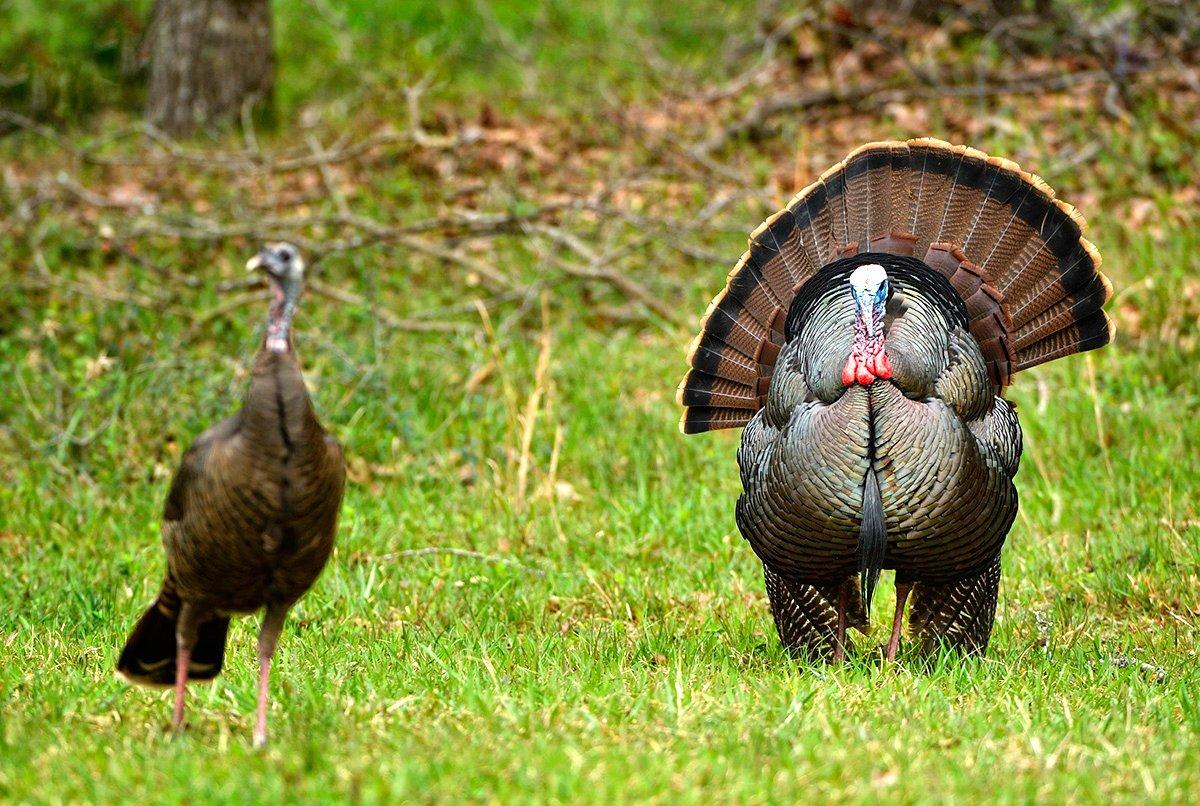The author matches wits with a particularly ill-tempered, public-land gobbler
In my experience, every longbeard in Mississippi's Homochitto National Forest is a Bad Bird. But the bird I came to know as the Eddiceton Warrior was among the baddest. Not only did he whip turkey hunters, but he whipped his fellow turkeys, too.
We crossed paths in 2009 when a hunting buddy showed me and my wife, Jill, a map, and explained how to get to a hard-to-reach chunk of guvment land that held lots of turkeys. (I'm as secretive as the next turkey hunter, so I'll only say the directions took us through the small town of Eddiceton.)
My buddy was right about the turkeys. After spending two gobble-free days hunting other parts of the Homochitto, we heard 11 gobblers on our first morning near Eddiceton. That's a virtual wealth of turkeys for that part of the world, and especially on public land. But if it sounds too good to be true, that's because it is. As I mentioned: Every Homochitto bird is a Bad Bird. So even in that target-rich environment, we couldn't make a sale that morning. That evening found us sitting on different ridges half a mile apart, trying to roost something.
It was after 6:30 p.m. when I first heard him gobble, some 300 yards up the creek bottom. At 7 p.m. he gobbled again, closer by half. Seconds later I saw him walking slowly through the bottom, headed my way. When he was 100 yards out, another bird gobbled behind him.
He changed directions like somebody had popped him in the butt with a peashooter. Back up the creek he went, moving fast. Almost as soon as he disappeared, I heard the fight start. It was a quiet, windless afternoon, and it sounded like the two toms were right in my lap instead of 150 yards distant. But sound and fury were all I got that day. The fight ended as dark fell, and I left.
Round Two
The next morning, we were listening from the ridge where I'd last seen the gobbler. He sounded off on cue, 100 yards beyond where I'd last heard him and on the opposite ridge. Jill and I set up a couple hundred yards apart, on either side of his roost site. If he walked along the bottom, one of us might have a chance.
He came my way, but he was following three hens rather than my calls. The little group was almost out of sight when another turkey gobbled. My tom gobbled back aggressively, then left his hens and started up the slope. The two gobblers met halfway, and this time I had a ringside seat.
The challenger wanted to strut and bluster, but never got the chance. The bird I'd been watching plowed into him like a bowling ball hitting a fresh rack of pins, and with much the same effect. The challenger found himself upside down in the leaves. As soon as he could break away, he flopped out of there like his tail was on fire. The Eddiceton Warrior, as I now thought of him, let him. He gobbled once at the rapidly retreating form before returning to his hens. Once reunited, they continued to ignore me, and drifted out of earshot.
A Rerun
The third morning found me and Jill split up again, listening from our respective second-day setups. The Eddiceton Warrior was home. He gobbled some, but again he wouldn't play. We did, however, hear him get into another fight with a bird we never heard gobble. At least, we assumed it was another gobbler. As cranky as the Warrior was, he might have been fighting a buzzard. Or a burned stump.
That afternoon I sat against the same tree from which I'd first seen the Eddiceton Warrior. Again, he gobbled up the creek bottom soon after 6:30 p.m. Again, I saw him walking toward me at 150 yards. This time, no gobbler interrupted his march toward what I figured would soon be his demise.
I was exposed but not silhouetted, thanks to the slope behind me, so I just needed to sit still. But I had to raise my gun, so I picked out a big pine tree between us. When the gobbler went behind it at 50 yards, I made my move.
Bad call. I misjudged the width of the tree, or the position of his head, or the speed of the Earth's rotation, because as the gun came to my shoulder, everything went south. He didn't stroll out from behind the tree as expected. Instead, he clucked four times, each fainter than the last. When I saw him again, he was 125 yards away, headed up the creek bottom.
Last Call
We rested him the next day, and hunted a familiar spot 30 miles north instead. Jill killed her half of what should have been a double, while her husband missed his half.
Consequently, I was perched on a low limb the fourth and final morning we had to hunt. The morning's driving rain didn't improve my mood. Jill wanted to try a new spot she'd been scouting, so I dropped her off in the dark and went back to battle the Warrior alone.
I wasn't expecting much, but it was turkey season, so I was still hopeful. I left my vest in the truck, donned a camo raincoat, and left the truck with just the essentials: my shotgun, shells, hat and head net, gloves and two diaphragm calls. At the edge of the creek valley I stopped to wait, feeling low and mean and sorry for myself. Daylight arrived slowly with the rain, and it was well after normal fly-down time when the Warrior gobbled, so close it scared me. I was leaning against a big pine and he was in the pine beside it, the trees so close their limbs overlapped. When he gobbled again, I picked him out as he hunkered close to the trunk. He was wet as a mud turtle and as miserable-looking as one of God's creatures can look.
But once he started gobbling, you would've thought it was a clear, dry morning. I waited and watched, resisting the temptation to shoot him on the roost. In the rain, turkeys usually don't sail off the roost so much as they fall to the ground under the tree.
It was after 8:30 a.m. and still raining hard when he decided to fly down. I heard his limb shed five gallons of water and heard his heavy wingbeats, and suddenly he was on the ground at 20 yards. He gobbled twice, then started walking away. When I shouldered my gun, he saw it, and increased his pace. I followed him with the barrel, but my glasses were so streaked and blurred with raindrops that I couldn't be sure I was on his head.
I never pulled the trigger, and it ended not with a bang but a splash. We went back to Eddiceton several times the following year and the year after, but we never heard another turkey fight.
More Realtree turkey hunting.








